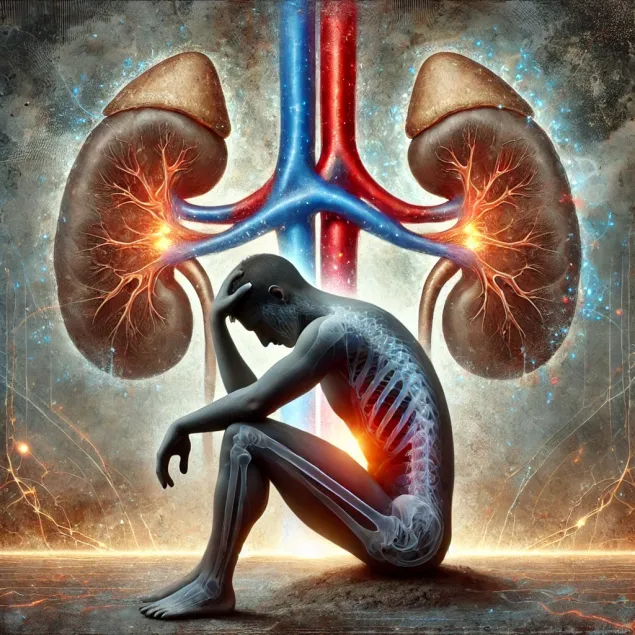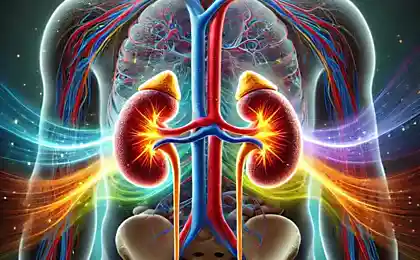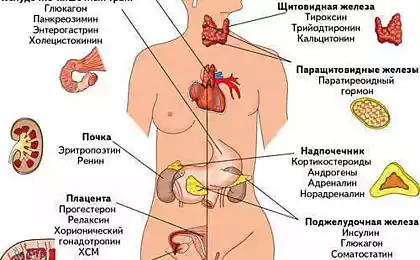420
Adrenal fatigue: worse than you think

When we talk about health, we often focus on organs such as the heart, liver, lungs or stomach. However, there is one organ that plays a key role in our well-being, but which few people think about until serious problems arise. We are talking about the adrenal glands - paired endocrine glands that are behind the peritoneum, in the lumbar region. These small but extremely important organs are responsible for producing hormones that regulate many body functions, including stress levels, metabolism and immunity. But what happens when the adrenal glands begin to “fatigue”? In this article, we will understand what adrenal fatigue is, how it affects health and what can be done to restore their normal functioning.

Health ecology: What is adrenal fatigue?
Adrenal fatigue is a condition in which the adrenal glands cannot produce enough hormones necessary for the normal functioning of the body. This is often due to chronic stress, prolonged overstrain, poor nutrition, or other factors that cause excessive stress on these glands. Under the influence of stress, the adrenal glands begin to produce the hormone cortisol, which helps the body cope with extreme situations. However, under constant stress, the adrenal glands can become depleted and their ability to produce enough cortisol and other hormones is reduced.
Symptoms of adrenal fatigue can be very diverse and do not appear immediately, which makes the diagnosis of this condition difficult. At first, a person may simply feel tired, decreased energy, problems with concentration and other unpleasant sensations that are easily attributed to normal fatigue or overload. However, over time, symptoms can get worse and this can lead to more serious health problems.
Causes of adrenal fatigue
The main cause of adrenal fatigue is prolonged stress, which leads to the depletion of these glands. Stress causes the release of cortisol, a hormone that helps the body cope with threats and loads. But when stress becomes chronic, the adrenal glands do not have time to recover and begin to work with overload. As a result, they lose the ability to produce the necessary hormones in the right amount.
Here are some of the main factors that can lead to adrenal fatigue:
- Chronic stress: Work, family problems, financial difficulties – all this can cause long-term stress.
- Sleep deprivation and insomnia: lack of sleep and constant fatigue significantly increase the load on the adrenal glands.
- Malnutrition: Diets that are low in nutrients or high in sugar can worsen adrenal function.
- Infections and inflammation: prolonged diseases can lead to chronic inflammation, which affects the work of the adrenal glands.
- Physical or emotional overload: Too much exercise or emotional overload can also lead to adrenal fatigue.
Symptoms of adrenal fatigue
Adrenal fatigue can manifest with a variety of symptoms that range from mild fatigue to more serious disorders in the body. Here are a few signs worth paying attention to:
- Constant fatigue: You feel unable to regain energy even after a long sleep or rest.
- Difficulty concentrating: You have difficulty focusing on tasks or making decisions.
- Mood swings: You become irritable, anxious, or depressed, even for no apparent reason.
- Skin problems: Acne, dryness, or skin rashes may be associated with hormonal disorders caused by adrenal fatigue.
- Decreased libido: Decreased sexual desire and problems in intimate life can also be symptoms of hormonal disorders.
- Frequent colds and infections: A weakened immune system can lead to frequent diseases.
- Sleep disorders: Insomnia or problems falling asleep are often associated with adrenal overload.
How to restore adrenal health?
If you notice symptoms of adrenal fatigue, it is important to take measures to restore their normal functioning. Here are some recommendations that may help:
1. Stress management
The first and most important step towards recovery is to reduce stress levels. This may include relaxation techniques such as meditation, breathing exercises, yoga or qigong. It is also important to learn how to manage emotions and avoid situations that can lead to chronic stress.
2. Normalization of sleep
Lack of sleep is one of the main causes of adrenal fatigue. Set your sleep schedule, lie down and wake up at the same time. Create a relaxing atmosphere before bed, avoid caffeine and bright lights.
3. Proper nutrition
Provide the body with the necessary nutrients. Include in the diet more vegetables, fruits, proteins and healthy fats. Avoid sugar, processed foods, and large amounts of caffeine, which can further strain the adrenal glands.
4. Physical activity
Moderate physical activity helps improve blood circulation, relieve stress and strengthen the immune system. However, avoid intense exercise as it can further deplete the adrenal glands.
5. Restoring hormonal balance
In some cases, hormonal therapy may be needed to restore the normal functioning of the adrenal glands. This should only be done under the supervision of a doctor who will conduct tests and determine whether you need to adjust your hormone levels.
Conclusion
Adrenal fatigue is not just a consequence of overwork, it is a condition that can seriously affect the quality of your life. It is important not to ignore the symptoms and take steps to restore the health of these key organs. Proper nutrition, stress management and a healthy lifestyle will help restore harmony in the body and return you energy and vitality.
The Eastern Youth Extension System by Shiar Duan Jin
10 Reasons Why Self-Confidence Makes You More Attractive























